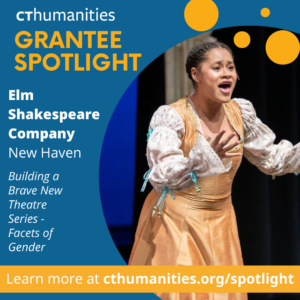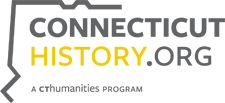Connecticut Humanities is proud to offer a variety of grant lines that support strong humanities projects and the institutions that offer them. Read on to learn more about some of our most recent grantees and their programs.
Elm Shakespeare Company, New Haven: Building a Brave New Theatre Series- Facets of Gender
Elm Shakespeare Company‘s Building a Brave New Theatre is a critical look at gender dynamics in Shakespeare’s works. The series is designed to spotlight compelling current issues, amplify voices from historically marginalized communities, and explore the complex interplay between gender and Shakespeare’s narratives. It builds upon Elm Shakespeare Company’s tradition of engaging deeply with societal themes through classical texts, pushing further into the conversations that define our times.
Shakespeare’s place at the apex of the Euro-centric classical canon has allowed the plays to sometimes be presented in ways which demeaned, erased or appropriated other cultures and excluded people. Elm Shakespeare Company believes in the transformative power of these plays and is committed to creating theatre that uplifts everyone in our community.
The 2024 Building a Brave New Theatre series includes:
- April 25th – By the Book: How Gender Shows Up in Shakespeare’s Plays Featuring Dr. Terri Power and Dr. Marguerite Tassi
- 7pm – Virtual
- May 16th through 19th – Tina Packer’s Women of Will
- 16th-18th @ 7:30pm, 19th @ 2pm – SCSU Blackbox Theatre
- June 6th – Lisa Wolpe’s Shakespeare & the Alchemy of Gender
- 7:30pm – Yale’s Schwarzman Center
- June 13th – Blk Grrrls and the Bard: How Brilliant BIPOC Artists are Changing the Conversation with Moderator Adriane Jefferson
- 7:30pm – Yale’s Sterling Memorial Library (HYBRID EVENT)
- June 29th – TRANSforming Shakespeare: How Creative Casting Makes Better Plays with Original Practice Shakespeare Festival’s Jennifer Lanier
- 2pm – Location TBD
Southern Connecticut State University (SCSU) Foundation, New Haven: Broadening and Deepening the Interpretation of the Henry Whitfield State Museum Permanent Exhibits
Over the last 5 years, the Southern Connecticut State University Foundation has partnered with the Henry Whitfield State Museum in Guilford to analyze over 50,000 recovered artifacts. A lack of records and its history as a location of a patriotic celebration of colonial-settler founders has left the museum almost exclusively focused on the 1639 origin of the “Old Stone House.”
The half-decade of collaboration between the museum and the archaeologists at SCSU provides an opportunity to expand the stories told at Connecticut’s oldest house. This includes highlighting the thousands of years of Indigenous occupation of the Quinnipiac River Valley, the experiences of tenant farming patriots during the Revolutionary War, as well as the story of the founding of the museum itself at the height of the industrial revolution. The Whitfield House will continue to be at the vanguard of public history education in Connecticut.
A new exhibit at the museum, History Beneath Our Feet, is already open to the public. It consists of recent archaeology finds on the museum grounds by the SCSU archaeology field school. These objects broaden our understanding of Connecticut’s history, bringing attention to the site’s 5,000+ years of Native American presence and the people who called the Whitfield House home after the Whitfield family sold it. Visitors can try digging for “artifacts” and search for exhibit mascot Trowely throughout the galleries.
Norwalk International Cultural Exchange (NICE), Norwalk: The Story of the Maasai
The mission of the Norwalk International Cultural Exchange (NICE) is to encourage the various groups that make up our society to learn about each other’s traditions and customs in order to foster a deeper understanding and appreciation of what each group brings to our community. NICE produces educational programs that invite collaboration and participation from multiple ethnic groups at the same time and within the same space so each group can share their cultural traditions while simultaneously experiencing and learning about the other groups that are also participating. The experiences are across sight, sound, and taste, and are presented through the visual arts, the performing arts, and culinary arts.
NICE is intentional in its partnership to ensure as many groups as possible do participate. NICE partners with groups including 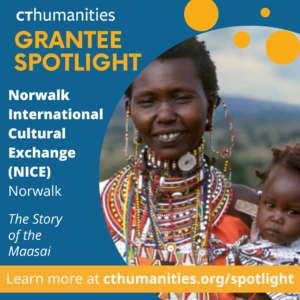 the Organization of Chinese Americans, The Sikhs of CT, The Pontian Society, the United Haitian-American Society, The Norwalk Historical Society, The Norwalk Housing Authority and numerous others. The programs are open and free to the public so everyone, regardless of economic status can attend at no costs. The programs have quickly developed as a hallmark of bringing our families and community together.
the Organization of Chinese Americans, The Sikhs of CT, The Pontian Society, the United Haitian-American Society, The Norwalk Historical Society, The Norwalk Housing Authority and numerous others. The programs are open and free to the public so everyone, regardless of economic status can attend at no costs. The programs have quickly developed as a hallmark of bringing our families and community together.
Join NICE as they present the Story of the Maasai on Saturday, April 6th at the South Norwalk Branch Library. Come hear the story of the Maasai people from Chief Joseph Ole Tipanko and his tribal delegation visiting the U.S. from Kenya. The group will speak about Maasai culture, including Maasai origins, traditional belief systems, rites of passage, integration into 21st century demands, and more. Enjoy a celebration of cultural heritage in music, dance, art, fashion, and language. This will be a fun, informative, interactive event for all ages. Families welcomed.
Norwalk Historical Society, Norwalk: Lafayette’s Bicentennial Tour of Connecticut in 1824
Lafayette’s Connecticut Bicentennial Committee and the Norwalk Historical Society are happy to present The Connecticut Lafayette Trail website, which is devoted to presenting information on the life of Marquis de Lafayette, his aid to America during the Revolutionary War, and his return trip to America in 1824 with a focus on his stops in twenty-six towns in Connecticut. 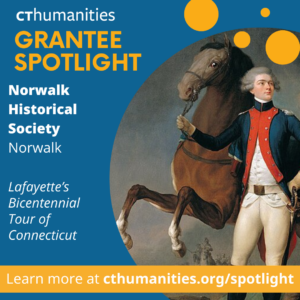
In 1824-1825, as part of a nationwide tour of the United States, Revolutionary War General Marquis de Lafayette passed through Connecticut making stops in twenty-six towns along the route. Although fifty years had passed since the close of the Revolutionary War, Lafayette was still revered by Americans and was greeted by thousands of citizens hoping to get a glimpse of the hero as he traveled through the state. Most historians believe that America could not have won the war without the help of the young French General and yet many Americans today know little about him.
Lafayette’s tour came at an important time as the country reconfirmed its allegiance to the ideas of the Founding Fathers and the memory of the war, fifty years earlier, which gave the nation its liberty and independence. Just as Connecticut residents in 1824 celebrated fifty years as a new country, Lafayette’s Connecticut Bicentennial Committee hopes that in the bicentennial year of 2024, their website and work with history organizations in the state will inspire a renewed pride in our country’s history and the people who played a part in founding our nation.
Families Network of Western CT, Inc., Danbury: Parent Leadership Training Institute, Spanish language cohort
The Parent Leadership Training Institute (PLTI) is a two-generational civics and democracy initiative designed to give participants the skills and tools of civic engagement so they can become effective advocates for children in the community. Families Network of Western CT is excited to offer this results-based model to the large and growing Spanish-speaking population of Greater Danbury in order to more fully include all voices in building an equitable community for all children to thrive.
PLTI is open to anyone who cares about the well-being of children. The program teaches you how to identify problems affecting children – in schools, communities, and local and state government – and work towards solutions. You’ll also complete a community project of your design to put your new skills into action!
Examples of community projects completed by the 2023 Danbury PLTI Class include: 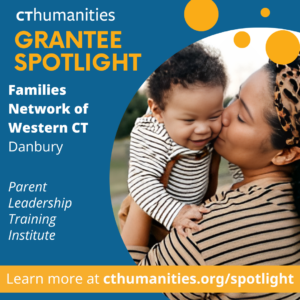
- “Circles of Connection: Interfaith Rituals for Healing After Miscarriage” – Helps women access, share, and process their experience after pregnancy loss.
- “Tots Mingle” – A group of mothers and their toddlers meeting in a public place to create lasting relationships.
- “How to Effectively Communicate with Teenagers” – A workshop for Spanish-speaking parents to help them communicate with their teenage children.
- “ELS & Babysitting: It’s Possible” – Providing more opportunities to learn English for stay-at-home non-English speaking parents.
Queen Ann Nzinga Center, Plainville: Exceptional Women Concert 2024
The Queen Ann Nzinga Center, Inc. is proud to announce its 15th annual Constance “Connie” Renee Wilson Collins Exceptional Women Concert. This event will honor outstanding women from New Britain, Plainville, and Bloomfield, paying tribute to their remarkable contributions throughout the community.
The honorees for the 2024 celebration are: 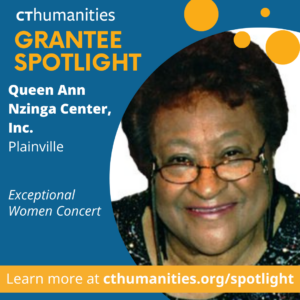
- Christine “Chris” Bryant, is a retired factory worker and currently a crossing guard
- Mallory Deprey, Community Services Program Manager for the City of New Britain
- Jodi Hill-Lilly, current Commissioner Designate of the Connecticut Department of Children and Families, leader and subject matter expert in racial justice and workforce development
- Rebecca Martinez, a nurse and member of the Plainville Board of Education and chair of the Plainville Democratic Town Committee
Originally named in 2014 in honor of Constance “Connie” Renee Wilson Collins, a Harvard graduate and African American woman whose impact on the Greater New Britain community was immeasurable, this event recognizes women who exemplify Collins’ spirit of service and community dedication.
The Exceptional Women Concert will be held at the New Britain Museum of American Art on Saturday, April 6th at 2 pm, and promises an evening of live musical performances, poetry, dance, and heartfelt tributes to the honorees. Live performances will include singer Ronnie Jenkins, Lauren Horn//Subira Vs Movement, Nzinga’s Daughters and the Nzinga’s Daughters R&B Band.
Thames River Heritage Park Foundation, New London: Stories from the Park – Island Affairs of the Thames
Inspired by “The Power of Place” in the Spring 2023 issue of ConnecticutExplored, Thames River Heritage Park’s 2024 lecture series “Stories from the Park: Island Affairs of the Thames” probes the historical impact and influence of the Thames River region’s connections to maritime travel, Long Island, the Desolation Islands, the West Indies and the Hawaiian Island of Lahaina. Throughout the series the “power of place” will be explored from social, cultural, political, economic and ecological perspectives along with impact and influence to life on the Thames – historically and up to the present time.
- Sailors, Whalers and Traders: Islands Connections to the Thames
An evening of stories and songs with Geoff Kaufmann
January 3, 2024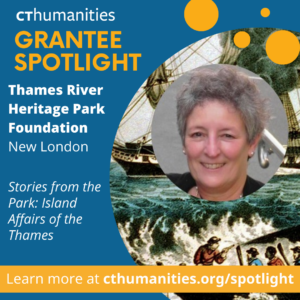
- Kinship, Trade and Culture: Eastern Long Island and the Thames
by Patricia Schaefer, New London County Historical Society
February 7, 2024 - Connecticut’s Sweet Tooth: New London, the Sugar Trade, and Slavery in the West Indies
by Matt Warshauer, Central Connecticut State University
March 6, 2024 - Bound for Desolation: Whalers and Sealers from the Thames
by Deborah Donovan, TRHP Director Emeritus
April 3, 2024 - Whaling, Religion and Royalty: New London and Lahaina
by Stephen Manuel, New London County Historical Society
May 1, 2024
Westport Museum for History & Culture, Westport: Outdoor Black History Standing Panel
Since its founding in 1889, the Westport Museum has been a humanities organization dedicated to preserving, presenting, and celebrating the history of Westport. As a cultural institution with a holistic focus, the museum is designed to contribute to the creation of a more just society.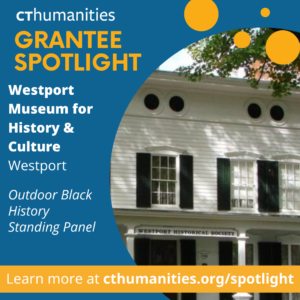
This project is an exterior standing panel to interpret an area within the Museum’s garden redesign featuring brick engraved with the names of Westport’s enslaved and early free people of African descent as featured in the award-winning CTH funded exhibit Remembered: The History of African Americans in Westport. The panel will also interpret the history of the house/site as originally Paugusset land and of the enslaved people believed to have worked on the site in the late 18th century.
The Westport Museum is always seeking new ways to present history that reaches people where they are. Collaborating with Cheyney McKnight and Not Your Momma’s History allows them to share hidden histories with new media audiences. Ms. McKnight’s following has come to expect engaging, well-researched content that provides a fresh way to think about hidden histories. They are delighted to be working with her in this new approach to shed light on the history of Black Women in Connecticut and hope this 3-part collaboration ladders up to a much larger ongoing project that can be accessed by the public and by educators alike.
La Grua Center, Stonington: On Our Minds/Good Stories Well Told Lecture Series
La Grua Center is a small nonprofit cultural arts center in Stonington offering a wide variety of lectures, concerts, and art exhibitions. La Grua Center’s mission is to engage the community through arts and culture. Their vision is an enriched cultural life for all. They present 12-15 speakers annually in several different humanities-based lecture series open to the public with a Q&A session immediately following. With these talks, it is their hope to explore other topics and different issues relevant in our region.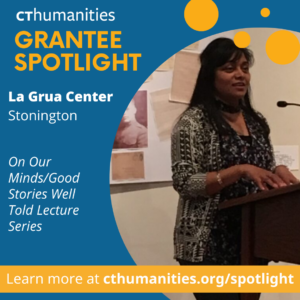
Thanks to grant funding from CT Humanities last year, they changed up their format to present lectures including Dayne Rugh (Slater Museum), Antoinette Brim-Bell (Poet Laureate), Bob Florence (Moromi/Fermentation), and David Eichelberg (Mohegan Tribe/Tantaquideon Museum). They are focused on elevating programming and making it more accessible to a wider and more diverse audience.
The format of the series will consist of a 60-minute presentation, often with accompanying slides. Two of the presentations have a performance aspect. All talks will be immediately followed by a Q&A session where audience members will engage with the speakers. This year’s series includes:
- “Power of Words” – Kolton Harris, Yexandra Diaz, Roodley Merillo, Mercuri Lam, Tarishi Midnight Shuler, Joshua Brown, and Nadia Sims
- “Kandie Carle, Victorian Lady” – Kandie Karle, Actor
- “The Thirteen Moons” – Nakai Northrup, Mashantucket Pequot Museum
- “Watch Hill Flying Horse Carousel” – Gary Anderson, CT Artist and Sculptor
ARTFARM, Middletown: Black Presencing: Reading Plays in the Community
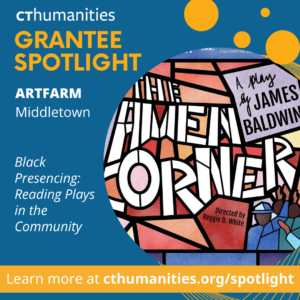 ARTFARM‘s next reading, The Amen Corner by James Baldwin, as part of the Black Presencing: Reading Plays in the Community series, will be March 3 at 5 p.m. at Cross Street AME Zion Church in Middletown.
ARTFARM‘s next reading, The Amen Corner by James Baldwin, as part of the Black Presencing: Reading Plays in the Community series, will be March 3 at 5 p.m. at Cross Street AME Zion Church in Middletown.
ARTFARM has been presenting “Black Presencing” events for the past three years, showcasing the work of Connecticut-based African-American performing artists. This year, they are expanding this into a community discussion exploring modern plays written by Black writers and the social and cultural issues that are unpacked in these works. For this project, they are partnering with Middletown-based Oddfellows Playhouse and Hartford’s HartBeat Ensemble.
This collaborative project intends to make three powerful plays — each addressing a significant cultural/social issue — accessible to a broad audience of young people and adults in central Connecticut by offering free Reader’s Theater presentations of the pieces and spurring conversations about the content of the works, guided by Black scholarship. The proposed season features one play that would be considered a modern classic (The Amen Corner, by James Baldwin, written in 1954) and two contemporary plays that elevate poignant social issues (Pipeline, a 2017 play by Dominique Morriseau which looks at the School to Prison pipeline, and Baltimore, a 2014 play by Kirsten Greenidge that centers around a racially-charged incident on a college campus.)
Additional partners are Wesleyan University Theater and African-American Studies departments, the Minority Student Coalition at Middletown High, and Cross Street AME Zion Church (where The Amen Corner will be performed). The Amen Corner will also be presented in Hartford as part of HartBeat’s Baldwin Centennial season, a series of productions and events celebrating the impact of 100 years of James Baldwin’s art and activism on the U.S. landscape.
Yellow Farmhouse Education Center, Stonington: Exploring the Past, Present, and Future of Oysters in American Coastal Cuisine
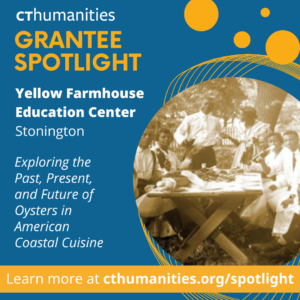 The Yellow Farmhouse believes that food is a natural and engaging entrypoint to learning about history and culture. In their 2024 Dandelion Series, the Yellow Farmhouse dives into the rich history of oysters in New York City and coastal New England and considers the role that shellfish might play in a sustainable food future, including:
The Yellow Farmhouse believes that food is a natural and engaging entrypoint to learning about history and culture. In their 2024 Dandelion Series, the Yellow Farmhouse dives into the rich history of oysters in New York City and coastal New England and considers the role that shellfish might play in a sustainable food future, including:
- A reading of High on the Hog: A Culinary Journey from Africa to America by Jessica B. Harris, where we learn about the culinary traditions and contributions of African Americans including Thomas Downing, “the Oyster King of New York” and the son of freed slaves. Culinary teachers receive free copies of the book to deepen understanding of African American culinary history, knowledge that they can incorporate into their teaching and share with their culinary students in area high schools.
- A virtual presentation from Ben “Moody” Harney, whose black-owned mobile oyster cart and catering business The Real Mothershuckers (based in NYC) was inspired by Thomas Downing. Mr. Harney explains how overfishing and water pollution affected oyster beds in New York Harbor in the 19th century and led to the shift of oysters from streetfood to luxury food in the 20th century. He also shares information about the Billion Oyster Project, which is working to restore oyster reefs in New York Harbor.
- An in-person oyster shucking class with Beth Simonds of Stonington Farms Shellfish at the New London Community Meal Center. Oysters are much more affordable when purchased directly from an oysterman or seafood purveyor and prepared at home. Ms. Simonds shares how she got started in aquaculture, her experience as a small-scale female farmer, and her perspective on the future of oyster farming in Connecticut.





